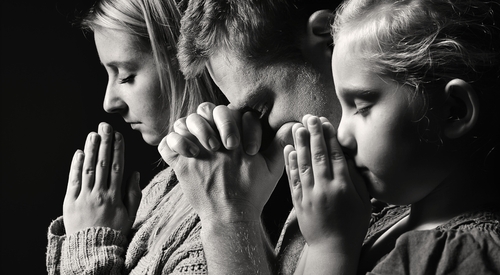“My life is deprived of peace, I have forgotten what happiness is; My enduring hope, I said, has perished before the LORD. The thought of my wretched homelessness is wormwood and poison; Remembering it over and over, my soul is downcast. But this I will call to mind, therefore I will hope: The LORD’s acts of mercy are not exhausted, his compassion is not spent; They are renewed each morning—great is your faithfulness! The LORD is my portion, I tell myself, therefore I will hope in him. The LORD is good to those who trust in him, to the one that seeks him; It is good to hope in silence for the LORD’s deliverance.” (Lamentations 3: 17-26)
In this passage from the Book of Lamentations of the Old Testament, the writer begins in a place of abandonment and hopelessness. But by the very act of a song of lament, the writer is reminded of hope in God.
Often in our liturgies we use language that makes it seem that Christians should never despair. Some participants at Mass may think that our time in church is supposed to always make us feel good, that God is our way out of all the bad feelings in life. Our media-driven culture can also lead us to believe that we should always be happy, that we should always feel good; that if we feel badly, something must be wrong with us. If we are disappointed, it’s our own fault.
These are not accurate interpretations of life, nor of relationship with God. These are not expressions of an honest faith. The life given to us by God is wonderful, but also messy, complicated, confusing, unsettling, sorrowful and filled with so many other difficult challenges and feelings.
How we pray in the midst of the ugly and negative moments makes a difference in the way we relate and respond to God’s call throughout our lives. This is important for our individual prayer and for our communal prayer. It is also important that every praying community find the means by which they can express their sacred sorrow and pain together. Lamentation can provide that honesty.
So, in the face of today’s institutional problems in the church, we need the honesty of lamentation. We feel a deep sadness for the members of the church who were victims of abuse perpetrated by persons of power within the church. We share their pain. We are angry at the criminal and sinful behavior of people who abused their trusted leadership. We are hurt that they have damaged our church and placed a cloud of darkness over us.
How do we incorporate prayers of lamentation into our liturgical prayer? There are ritual prayers and actions in the Mass that are unchanging, but there are also moments and music that can be flexible, that can and should express our anger, hurt, confusion and pain. We need the expressions of our faith, in the midst of all this darkness, to be honest and true.
Parish liturgy committees might want to plan lamentation prayer times for their community, or incorporate moments of lament during the flexible parts within Sunday Mass. Consider using the music and words provided here, or something similar:
Bob Hurd, “Lamentation;” David Haas, “God Weeps;” Anne Quigley, “There Is a Longing;” Bob Dufford, “Save Us, O Lord;” Marty Haugen, “Shepherd Me, O God;” Scott Soper, “You Are the Healing;” African-American Spiritual, “I Want Jesus to Walk with Me.”
The spiritual might be most effective a capella, or accompanied by only one wind or string instrument, (no keyboard or guitar).
Psalms of lament might also provide the spirit needed: Psalms 13, 22, 39, 51, 56 or 92.
Here are some effective words of lamentation put together by OCP composer, Paul Inwood, (2010), adapted as follows.
Presider: The church finds itself wracked with pain. Let us pray for all those who are wounded and weary.
Reader: For the pain of people whom the church should have cherished and who were left forsaken, we pray: Send your healing spirit, Lord.
Reader: For the pain of priests seeing the suffering inflicted by people they knew as brothers, we pray: Send your healing spirit, Lord.
Reader: For the pain of those whose trust in the church and its ministers and religious men and women has been utterly destroyed, we pray: Send your healing spirit, Lord.
Reader: For the pain of those falsely accused, we pray: Send your healing spirit, Lord.
Reader: For the pain of those ashamed of what they were once so proud to be, we pray: Send your healing spirit, Lord.
Reader: For the pain of a church, frightened and confused, suddenly awakened to an evil within, we pray: Send your healing spirit, Lord.

